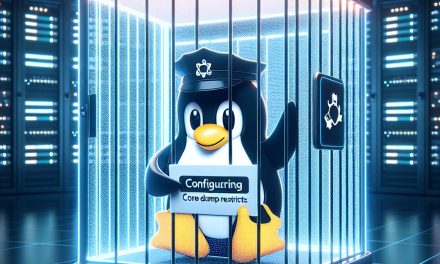Cron jobs are a powerful feature in Linux that lets users automate tasks by scheduling scripts or commands to run at specified intervals. However, allowing unrestricted access to cron job creation can lead to a variety of issues, such as resource abuse, security vulnerabilities, and system instability. Therefore, it’s crucial for system administrators to implement user restrictions on cron job creation for enhanced management and security on Linux servers.
In this article, we will explore effective methods for restricting user access to cron job creation on Linux servers, ensuring a balanced environment suitable for both performance and security.
Understanding Cron Jobs
Cron is a daemon that runs in the background and executes scheduled tasks at defined times. Users can create their cron jobs via the crontab command, which manages user-specific cron schedules. Each user can set up their jobs, but unrestricted access can lead to potential issues, including:
- Unattended resource consumption (CPU, memory, I/O)
- Security risks from malicious scripts
- Conflicts with critical processes
- Just clutter in the crontab, making maintenance difficult
To combat these issues, administrators can implement various strategies to limit and manage cron job creation.
User and Group Restrictions with Crontab
1. Using /etc/cron.allow and /etc/cron.deny
One of the simplest methods for controlling access to cron jobs is through the use of the cron.allow and cron.deny files. These files specifically manage which users can create and manage cron jobs.
Setting Up cron.allow and cron.deny:
-
Create Files: First, check if the files exist. If not, create them:
sudo touch /etc/cron.allow
sudo touch /etc/cron.deny -
Modify Permissions: Update the permissions to restrict access:
sudo chmod 600 /etc/cron.allow /etc/cron.deny - Configure Access:
/etc/cron.allow: List users who are allowed to use cron./etc/cron.deny: List users who are not allowed to use cron.
If both files exist, a user will only be granted access if they are listed in cron.allow. If cron.allow does not exist, then users listed in cron.deny will be prohibited from using cron.
2. Setting User Permissions
In addition to the allow and deny files, modify user permissions through groups. This process can also be accomplished using the sudoers file. For example, you might have a group of users who should be allowed to run specific cron jobs.
Step-by-step:
-
Create a Group: Create a new group, for example,
cronusers:sudo groupadd cronusers -
Add Users: Add users to this group who should have permission to create cron jobs:
sudo usermod -a -G cronusers username - Configure
sudoers: You can use thesudoersfile to restrict access to commands that can be executed via cron.
3. Limiting Resource Consumption
If specific users require cron access but can threaten system performance, consider using tools like cpulimit, nice, or ionice. This allows you to control how much CPU and IO resources a cron job consumes without preventing users from executing their jobs.
-
Install
cpulimit:sudo apt-get install cpulimit - Modify Crontab Entries: When creating crontab entries, incorporate resource limits:
* * * * * cpulimit -l 20 /path/to/script.sh
The -l option sets a limit (in percentage) on CPU usage which can help preserve overall system performance.
4. Using Custom Scripts
If finer control is necessary, you can use wrapper scripts to manage user submissions:
- Create Wrapper Script: Write a script that checks user permissions before allowing the execution of the intended command.
- Place Script in
/usr/local/bin: Ensure it’s accessible in the user’s PATH. - Modify Crontab Entries: Point cron jobs to the wrapper script to enforce the rules implemented.
5. Audit Cron Jobs Regularly
Regular audits of cron job entries can help catch unauthorized or unnecessary tasks that may have been created inadvertently:
sudo crontab -l
sudo cat /var/spool/cron/crontabs/* Review and delete any suspicious entries as necessary.
Conclusion
Implementing user restrictions on cron job creation is a necessary practice to ensure the stability, performance, and security of Linux servers. By configuring /etc/cron.allow and /etc/cron.deny, managing permissions through groups, limiting resource consumption, using custom scripts, and conducting regular audits, system administrators can establish a controlled and efficient scheduling environment. By effectively managing cron jobs, you enhance the overall functionality of your Linux server infrastructure.
For more insights on system administration and best practices, stay tuned to the WafaTech Blog!





